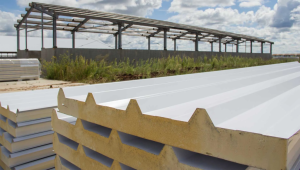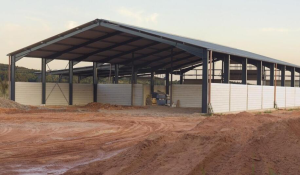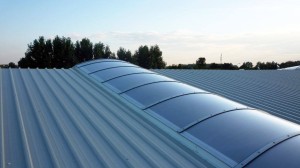Insulated panel applications in industrial and residential construction - Sandwich panels is a building material that is very popular in both industrial and residential construction. Thanks to their versatility, insulating properties and aesthetic appeal, they are used in a variety of applications that address the specific needs of different building types. In this article, we take a look at how sandwich panels are used in both areas of construction, highlighting their advantages and examples of applications.

1. sandwich panels in industrial construction
Industrial construction often places specific demands on building materials, such as weather resistance, thermal and acoustic insulation, and durability. Sandwich panels, thanks to their properties, are the ideal solution for such applications.
- Production halls: Sandwich panels are widely used in the construction of production halls. Thanks to their high thermal insulation, they help to maintain an optimal temperature inside the facilities, which is important for production processes that are sensitive to temperature changes. In addition, these panels provide good sound insulation, which is beneficial for noisy production processes.
- Warehouses: In warehouses where fast and efficient space management is important, sandwich panels allow walls and roofs to be installed quickly. Their excellent thermal insulation helps to maintain a constant temperature inside warehouses, which is crucial for storing sensitive goods. In addition, these panels can resist moisture and corrosion, which is important in environments with high humidity.
- Commercial facilities and distribution centres: Sandwich panels are also used in the construction of large commercial buildings and distribution centres. They offer an aesthetically pleasing façade finish while providing excellent thermal and acoustic insulation. In such facilities, fast construction speed, which sandwich panels enable, is also crucial.
- Transport infrastructure: In transport construction, sandwich panels are used in the construction of vehicle halls, airport terminals or railway stations. Their resistance to weather conditions and ease of installation make them an ideal material for such facilities.

2. sandwich panels in residential construction
In residential construction, sandwich panels can be used in a variety of ways, both in new buildings and when renovating existing structures. They offer aesthetics, comfort and energy efficiency.
- Single-family homes: Sandwich panels can be used for the construction of modern detached houses. With a variety of finishing options, such as steel sheet, aluminium or PVC, it is possible to customise the appearance of the façade to suit the owners' preferences. Excellent insulation properties help to maintain a comfortable temperature inside the building and reduce running costs.
- Multi-family buildings: In multi-family buildings, sandwich panels are used in the construction of external walls and roofs. Their acoustic properties are particularly important in this type of building, where good sound insulation is crucial for the comfort of the occupants. The panels are also weather-resistant, ensuring the durability and longevity of the building.
- Revitalisation and renovation: Sandwich panels are often used in projects to revitalise and renovate old buildings. They can be used to replace old facades, improve thermal and acoustic insulation, and retrofit roofs. Quick installation and the ability to adapt the aesthetics to the style of the existing building are big advantages in such projects.
- Leisure and sports facilities: In the construction of leisure and sports facilities such as swimming pools, sports halls or fitness centres, sandwich panels can be used for walls and roofs. Their resistance to moisture and ease of maintenance make them suitable for such applications. In addition, the panels can help improve sound insulation in facilities where noise is an important factor.
3. comparison of applications in industrial and residential construction
- Technical requirements: In industrial construction, there is often more emphasis on durability and weather resistance, while in residential construction, aesthetic aspects and user comfort are also important. Sandwich panels meet both of these requirements thanks to their versatility.
- Construction pace: Sandwich panels allow rapid installation in both industrial and residential buildings. Their prefabrication and ease of installation speed up the construction process, which is beneficial for projects where time is a key factor.
- Costs: In both cases, sandwich panels can lead to savings through energy efficiency and quick installation. While the initial cost may be higher, the long-term benefits of lower running costs can outweigh the investment.

Summary
Sandwich panels are a versatile building material that is suitable for both industrial and residential construction. Thanks to its insulating properties, aesthetics and durability, They are an ideal solution for different types of buildings. Their use can improve energy efficiency, occupant comfort and building aesthetics. Understanding how sandwich panels can be used in different contexts allows them to be better suited to the specific needs of building projects.










